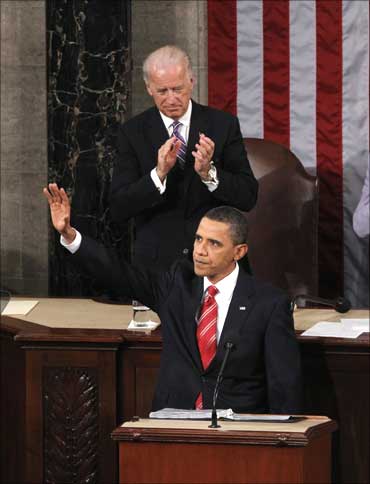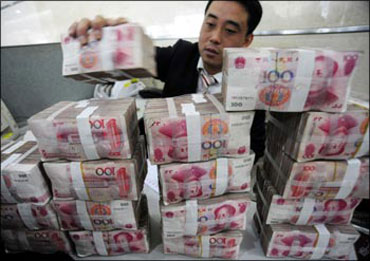 | « Back to article | Print this article |
India less affected by economic crisis: US
Due to India's limited dependence on external demand and strong fiscal and monetary stimulus measures, the global economic and financial crisis had a relatively muted effect on the country, the Obama Administration told the US Congress on Thursday.
"The global economic and financial crisis had a relatively muted effect on India, due to the country's limited dependence on external demand, and strong fiscal and monetary stimulus measures," the Treasury Department said in its semi-annual report to the US Congress.
Delayed by nearly three months, the 35-page report to the Congress on international economic and exchange rate policies, however, notes that the rate of growth of the Indian economy slowed down during the period of the global economic crisis, though it has bounced back.
"Economic growth slowed to 6.8 per cent in 2009, compared to an average rate of 9.4 per cent in 2005 to 2007. Real GDP expanded by 16.8 per cent on a seasonally adjusted annualised basis in the third quarter of 2009, before contracting in the fourth quarter by 2.8 per cent as the worst monsoon in nearly 25 years resulted in a steep decline in agricultural output," it said.
India less affected by economic crisis: US
"The fourth quarter was only a pause in the recovery. The economy grew by 13.5 per cent on an annualised basis in the first quarter of 2010. The IMF expects the Indian economy to grow by 9.4 per cent in 2010," the report said.
Noting that the 2009 monsoon boosted inflation, it said rising food prices pushed average monthly CPI inflation to 13.3 per cent year-over-year in the second half of 2009, compared to an average of 9.6 per cent in the first half of the year.
In April, 2010, CPI inflation in India stood at 14.4 per cent. As a result of India's robust recovery in the second half of 2009 and rising inflationary pressures, the Reserve Bank of India (RBI) and the Indian government are normalising monetary and fiscal policy conditions, it said.
In January, 2010, the RBI raised its cash reserve ratio by 75 basis points (to 5.75 per cent) to reduce excess liquidity in the banking system. In March, it raised both the repo (lending) and reverse-repo (liquidity absorption) rates by 25 basis points. Subsequently, in April, it raised all three policy rates by an additional 25 basis points, the report said.
India less affected by economic crisis: US
"Global economic conditions improved in the second half of 2009, with clear signs of economic recovery in most countries. "By the fourth quarter, signs of recovery were evident in all the economies discussed in this report, except Venezuela," the Treasury Department said in its semi-annual report to the Congress on international economic and exchange rate policies.
The recovery has been strongest in the emerging economies, notably in Asia.
India less affected by economic crisis: US
Global trade expanded and financial market conditions improved substantially in the second half of 2009.
"Nevertheless, in many countries the economic recovery was dependent on fiscal and monetary policy stimulus and in particular, labour markets remained weak," said the 35-page report. Observing that the world economy was pulled back from the brink and has resumed growth, it said a durable recovery is still not fully secure.
Global economic growth is now projected by the IMF to be 4.6 per cent in 2010, which is nearly 2.5 times the pace of growth projected for 2010 in the spring of 2009, it said. Although unemployment rates remain elevated and unacceptably high, job growth has returned, according to the report.
International trade has increased sharply and has nearly returned to the pre-crisis level following a collapse of more than 35 per cent in the value of trade between the second quarter of 2008 and the first quarter of 2009.
India less affected by economic crisis: US
"Emerging market economies have recovered more quickly than most advanced economies. Economies in Asia, but also some in Latin America (Brazil, for example), have performed especially well. Some emerging market economies have begun to scale back their macroeconomic stimulus," the Treasury Department said.
India less affected by economic crisis: US
China, it said, was a significant source of economic support in 2009, generating a 13 per cent increase in domestic demand that contributed 1.6 percentage points to global growth at a time when total world demand declined 0.6 per cent.
China's stimulus contributed to the expansion of US exports to China by 15 per cent in the second half of 2009, while US exports to the rest of the world decreased by 13 per cent. However, some economies, notably in Europe, are recovering more slowly, it said.
The IMF is forecasting economic growth of 1.0 per cent in the euro area in 2010 and 2.4 per cent in Japan. "Much of this projected growth is expected to be export-driven, as private sector demand continues to be weak, particularly in Japan and Germany, two economies with large external surpluses," it said.
"Both economies need to focus on reforms that strengthen private sector demand growth to contribute to a better balanced and more sustainable global economy," the report noted.





